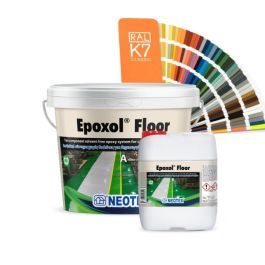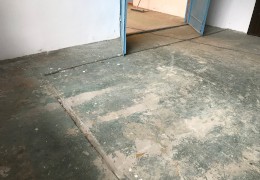Epoxy resin for floor screeds. Self-leveling and solvent-free, resistant to chemicals (alkalis, diluted acids, gasoline, oils, and many solvents), it is available in a wide range of RAL colors. It has a Greek hygiene certificate and is certified for contact with food and alcohol, making it suitable for use in food production and processing areas.
- Wroclaw,
- Katowice,
- Warsaw,
- Gdansk,
- +48 717 026 346
Epoxy resin for concrete
What is epoxy resin?
Epoxy resin is a synthetic chemical material characterized by high durability, resistance to mechanical damage, and aesthetic appearance. It consists of two main components: resin and hardener, which, when combined, create a durable, damage-resistant surface.
Why choose epoxy resin for concrete?
Concrete is a popular building material, but its surface can be susceptible to mechanical damage, liquid ingress, and contamination. Epoxy resin offers an ideal solution because:
- Protects concrete against moisture, chemicals and mechanical damage.
- Increases surface durability by creating an abrasion-resistant protective surface.
- It adds aesthetic appeal thanks to the ability to choose from a variety of colors and finishes. A wide range of decorative solutions allows you to preserve both the raw character of the material and an aesthetic, colorful finish.
- It facilitates cleaning and maintenance of the surface thanks to its smooth surface without joints.
Types of epoxy resins for concrete
Colorless epoxy resin
Transparent epoxy resin preserves the natural appearance of concrete while protecting it from external factors. It's ideal for home surfaces, such as resin floors in living rooms or stairs. It's also a solution for decorative flooring , where the design involves embedding a specific element or image in the floor. Epoxol® 3D is ideal for this purpose. There are also colorless resins for embedding objects, such as wood, such as Telpox C300 .
Colored epoxy resin
Available in a wide range of colors, it allows for the personalization of concrete surfaces. It is ideal for garages, workshops, and production halls, where appearance is important in addition to functionality. Our portfolio includes products with a ready-made color range, such as Neopox® Special , as well as those tinted to meet specific project needs, such as Neopox® W Plus , Epoxol® Floor and Neopox® SF Plus .
Epoxy resin with anti-slip additives
The addition of anti-slip substances makes the surface safer. This is an ideal solution for areas exposed to high levels of moisture, such as bathrooms and kitchens. Anti-slip additives combined with epoxy resin allow for various anti-slip classes, from R9 to even R13.
Industrial epoxy resin
Designed for use in high-traffic areas exposed to intense stress. It is characterized by increased resistance to abrasion and chemicals. This type of resin is often applied in thicker layers, creating a coating resistant to these stresses. Furthermore, industrial epoxy resin exhibits exceptional resistance to various chemicals, such as acids, alkalis, oils, and fuels, providing long-term, effective protection for concrete floors.
Advantages of epoxy resin for concrete
- Chemical resistance – creates a coating that provides excellent protection against acids, oils, and other substances. This makes it suitable for use in garages, where there is a risk of contact with fuels, as well as in industries producing and storing food and various chemicals.
- Mechanical durability – withstands intense loads and heavy traffic, including cars, trucks, and forklifts. Depending on the loads the floor will be subjected to, it is recommended to choose an appropriate epoxy system that takes into account varying resin thicknesses.
- Aesthetics – a smooth, shiny surface enhances the appearance of any interior. Resin coatings allow for seamless surfaces, which translates not only into a beautiful appearance but also makes the floor easy to keep clean. The only joints found in resin floors are expansion joints.
- Moisture resistance – ideal for bathrooms, swimming pools, and garages. Epoxy resin, due to its structure, is resistant to moisture, making it an excellent coating for protecting concrete surfaces. This allows for extending the life of concrete by several to even decades.
- Long lifespan – with proper maintenance, it can last for years. Epoxy resin, like anything else, degrades with use. However, these types of coatings are significantly more durable than traditional solutions for both walls and floors. These resins originate from industrial processes, where they were subjected to various load tests. However, for a floor to function as effectively as possible, proper maintenance is essential, which includes regular cleaning and repairing minor damage if it occurs. It's also worth remembering that if an epoxy resin coating comes into contact with chemicals, it's best to remove them as soon as possible to reduce chemical stress on the coating and extend its lifespan.
How to apply epoxy resin to concrete?
Applying epoxy resin to concrete requires several sequential steps. These include:
Surface preparation
- Concrete cleaning – it's necessary to remove dust, dirt, and other loose, poorly adhering concrete particles. If greasy stains are present, degreasing the concrete is necessary, for example, using surfactants. Failure to remove grease from the concrete significantly reduces the adhesion of the epoxy resin.
- Repairing damage – it's worth filling in any gaps, leveling the surface, and repairing any damage. This will not only improve the adhesion and durability of the epoxy resin coating but also enhance the visual appearance of the final resin surface.
- Grinding – Before applying epoxy resins, grinding the concrete is essential. The extent of grinding depends on the type of epoxy resin being applied. This will differ for thin-film materials applied by roller than for self-leveling epoxy resins such as Epoxol® Floor .
Soil application
- An epoxy resin primer is applied to the prepared surface to ensure optimal adhesion for subsequent layers of the system. A properly primed substrate with epoxy primer achieves a fully polished finish. If dull spots appear on the primed surface, a second coat may be necessary.
- The primed surface should be left until the resin has cured, which depends on the prevailing weather conditions. Both temperature and humidity can lengthen or shorten this time. All relevant information can be found in the technical data sheets of the products used, and familiarizing yourself with them before application is essential for proper execution of the entire process.
Applying the resin
- Once the substrate is properly primed, you can proceed to applying the resin. To do this, prepare a mixture consisting of an epoxy resin base and a hardener. Mixing proportions can be found in the technical data sheet of each product.
- The prepared resin mixture is then applied, depending on the type of epoxy resin: with a roller, brush, spray, squeegee, or squeegee . Manufacturers usually provide information on how to apply the resin on their websites or in the product data sheet. An example is Neopox® Special , which is a thin-layer epoxy resin applied by roller, brush, or spray. Epoxol® Floor, a high-build epoxy resin, is spread using a serrated squeegee to the desired system thickness.
- The applied epoxy resin should be allowed to dry. If a second coat is necessary, it must be applied within the time specified in the technical data sheet. After the recoating time has elapsed, the surface should be mattified by sanding before applying the next coat. The applied resin should then be left to fully cure, which in the case of epoxy resins takes approximately 7 days.
Care and maintenance of epoxy resin surfaces
- Regular cleaning – using mild detergents and avoiding harsh brushes is recommended. Removing contaminants such as chemicals, sand, and dust in this way will keep the epoxy coating in good condition for much longer.
- Avoiding mechanical damage – it is recommended not to move heavy objects without protective pads. In apartments, it is recommended to pad furniture with felt pads, for example, to protect resin floors from scratching. In areas prone to scratching, for example from sand, it is worth considering additionally protecting the floor with a protective varnish. An example is the polyurethane varnish Neodur® Varnish .
- Periodic maintenance – it's worth periodically inspecting surfaces protected with resins. An additional, thin layer of material can also be applied in areas of increased wear to maintain the coating in good condition for as long as possible.
Product offer
Does epoxy resin require priming?
keyboard_arrow_down keyboard_arrow_upYes, priming is recommended because it improves the resin's adhesion to the concrete surface, which translates into a long-lasting and aesthetically pleasing coating. Some resins can be applied directly to the concrete substrate without primer, but this is always specified by the manufacturer in the technical data sheet and depends on many factors, such as the concrete quality and moisture content.
How long does it take for epoxy resin to dry on concrete?
keyboard_arrow_down keyboard_arrow_upDrying time depends on the resin type, temperature, and humidity. Typically, the first layer dries in 12 to 24 hours, and full curing occurs in up to 7 days.
Can epoxy resin be used on concrete outdoors?
keyboard_arrow_down keyboard_arrow_upYes, but you should check whether the epoxy resin you're considering is UV-resistant, as epoxies aren't inherently resistant. Applying a UV-resistant topcoat can mitigate this problem, and the concrete protection system could then look like this:
Is epoxy resin resistant to mechanical damage?
keyboard_arrow_down keyboard_arrow_upYes, epoxy resin is highly resistant to scratches, impacts and abrasion, making it an ideal solution for heavily used surfaces.
Proven products
We offer products with high durability and technical parameters, ensuring long-lasting results.

Help in choosing
Wondering which products will best suit your needs? Call us – we'll advise you and choose the right solution.

Contractor support
Need help with construction work? Let us know, and we'll recommend trusted contractors.
Stationary points
Want to pick up your products in person? Or perhaps you'd prefer to chat face-to-face? Visit our branches in Warsaw, Wrocław, Katowice, or Gdańsk.





